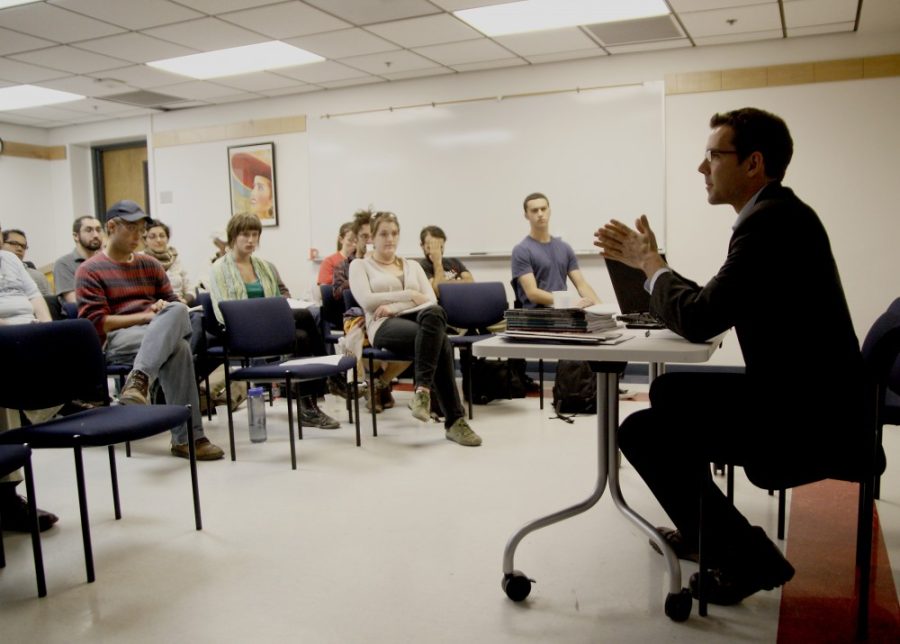A member of Human Rights Watch was forced to defend his statements at a heated forum on Tuesday after several members of his audience accused him of taking a biased approach to the Israeli-Palestinian conflict.
Bill Van Esveld is the senior researcher on the Middle East and North Africa for Human Rights Watch, a group that defends human rights worldwide. He spoke to a crowd of about 35 UA community members at the “Separate and Unequal” talk, hosted by UA No More Deaths/No Más Muertes, on a report he wrote that examines discrimination in Israeli-controlled areas of the West Bank, a Palestinian territory.
Van Esveld emphasized that both he and his organization are nonpartisan and concerned with prosecuting those who abuse human rights law regardless of their nationality, ethnicity, religion or otherwise. This disclaimer became important later on in the forum when members of the audience accused Van Esveld of being pro-Palestine in regard to Operation “Cast Lead,” an Israeli military campaign in the Gaza Strip that killed about 1,400 Palestinians during December 2008 and January 2009.
War has been raging between the Palestinians and the Israelis since at least 1917, when the international leaders designated Palestinian territory to be the new home for displaced Jews. Conflict broke out as a result of the decision, and tension only increased when the United Nations divided the land into separate Jewish and Palestinian states in 1947.
Ken Miller, a graduate student in the Judaic Studies department and self-declared supporter of Israel, was the first to challenge Van Esveld’s comments. He said Van Esveld’s criticisms of the operation failed to mention what took place the year before it began.
“A couple thousand rockets, mortars and missiles were launched from the populated areas in Gaza against the residents in Southern Israel,” Miller said. “You’re not mentioning that at all in context with why Israel would go in to retaliate against Hamas in Gaza.”
As he continued, two other men in the audience, both of whom were pro-Palestine, spoke up. Soon, the three men were shouting over each other and Van Esveld was struggling to regain control of the discussion.
“Let him speak! Let him speak!” Jeff Wilson, a professor of anthropology at Pima Community College yelled from the back of the room, referring to Van Esveld.
Once Van Esveld recaptured the floor, he acknowledged that wrongs have been committed by both parties. However, Human Rights Watch seeks to hold governments accountable for violating the laws of war. In order to do that effectively the group must investigate specific events, not longstanding conflicts left over from the 1940s.
“We do not try to say, ‘Yes, Hamas launched rockets for years, therefore everything Israel did was justified,’” Van Esveld said. “We would say, ‘Hamas launched rockets for years, Israel is justified in launching a military campaign to stop rocket fire against civilians, but that doesn’t justify everything.’ You have to fall within the laws of war.”
Van Esveld then turned the discussion over to his report on the West Bank, which outlines discriminatory policies implemented by the Israeli government toward Palestinians.
The majority of the West Bank is occupied by settlers from Israel and controlled by the Israeli government. However, a population of about 150,000 Palestinians also live in these areas, according to Van Esveld.
His report found that Palestinian residents in the area suffer from discrimination due to biased government policies, whereas Israeli residents do not.
“For every building permit that the Israeli military gives to Palestinians, it destroys 18 Palestinian houses and issues demolition orders against another 55,” Van Esveld said. “If you’re (an Israeli) settler, you get free education, transportation, you get tax benefits, you get water subsidies, electricity subsidies, infrastructure built to your house, etcetera.”
This disparity between government policies, not the Israeli population, is what Human Rights Watch attempted to expose and persecute in his report, he said.
“There are some settlers who are really nasty people, there are other settlers who are just regular people, they’re quite nice,” he added.
This comment came under fire by one audience member, Jody Gibbs of the organization Voices of Opposition, who asked, “Under international law, can Israel move settlers into a territory which is not theirs?”
Van Esveld attempted to answer his question, but Gibbs interrupted.
“It’s a violation of international law, right? How can we say those are ‘nice’ people?” Gibbs said before speaking for several minutes on the issue of Israeli settlement in Palestine.
As he spoke, Wilson shouted from the corner, “What’s the question?”
Several more challenges from various attendees prevented Van Esveld from addressing Gibbs’ question fully. His final comment touched on the decline of democracy in Israel, citing instances in which Israelis who have called for boycotts in the country have been subjected to civil law suits.
“Israeli democracy is actually going in the wrong way, even for the people it used to protect,” Van Esveld said.








